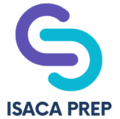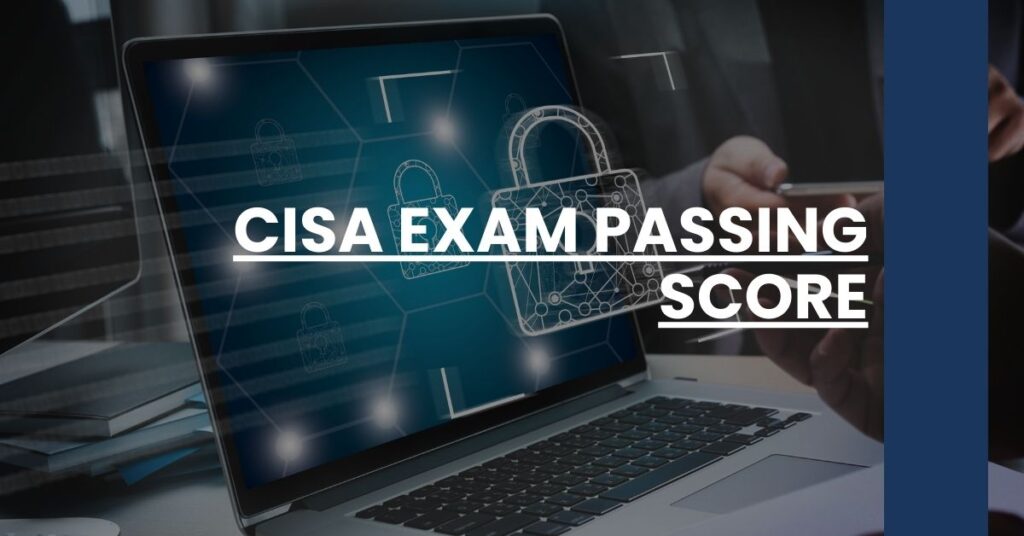To achieve Certified Information Systems Auditor (CISA) success, aim for a passing score of 450 or higher on a scale of 200 to 800. This threshold validates your expertise in information systems audit, control, and security.
Earning this credential sets you apart in the field of IT security, audit, risk management, and governance.
In this article, you’ll gain insights on:
- The structure and scoring system of the CISA exam
- Study strategies to exceed the passing score
- Resources to guide your exam preparation efforts
Embark on your journey to CISA excellence—read on for key methods to conquer the exam.
- Understanding the CISA Certification
- Breaking Down the CISA Exam Structure
- Demystifying the CISA Exam Scoring Mechanism
- Elucidating the CISA Exam Passing Score
- Factors Influencing the CISA Passing Score
- Preparing for the CISA Exam: Study Tips and Strategies
- The Impact of Not Achieving the CISA Passing Score
- Resources and Support for CISA Exam Preparation
- Frequently Asked Questions About the CISA Exam
- Conclusion: Embracing the Challenge of the CISA Exam
Understanding the CISA Certification
The Certified Information Systems Auditor (CISA) accreditation is a prestigious professional certification that opens doors to a career in information systems audit, control, and security. As one who aspires to join this elite group of professionals, you understand that earning the CISA certification is a testament to your expertise and commitment to excellence in this field.
This certification, offered by the Information Systems Audit and Control Association (ISACA), is designed for IT auditors, audit managers, consultants, and security professionals. A CISA credential validates your ability to assess an organization’s information systems and ensure they are managed and monitored effectively. It confirms your knowledge in the areas of governance and management of IT, system acquisition, development, and implementation, information systems operations and business resilience, protection of information assets, and of course, the information systems auditing process.
Securing this certification involves meeting ISACA’s strict criteria, which includes a rigorous examination. The CISA exam is renowned for its depth and breadth, covering a gamut of concepts essential for mastery in the field of IT auditing. To meet these challenges head-on, understanding the structure and requirements of the CISA exam is paramount to your preparation.
Breaking Down the CISA Exam Structure
At the core of your journey toward becoming a Certified Information Systems Auditor is a deep and thorough comprehension of the CISA exam’s structure. Spanning 150 questions, the CISA exam is designed to evaluate your knowledge spread across five job practice areas:
- The process of auditing information systems.
- Governance and management of IT.
- Information systems acquisition, development, and implementation.
- Information systems operations, and business resilience.
- Protection of information assets.
Each of these domains carries varying degrees of weight, reflecting their importance and relevance in your role as an information systems auditor. The format of the questions is predominantly multiple-choice, which requires not only your comprehension of the subject matter but also your ability to apply this knowledge practically.
The exam is administered over a four-hour period, and it is structured to push your boundaries in analytical thinking and problem-solving. Moreover, ISACA’s detailed exam content outline is an indispensable resource that provides you insights into the specific areas of knowledge that will be tested.
Demystifying the CISA Exam Scoring Mechanism
Navigating through the scoring mechanism of the CISA exam is no less intricate than the subjects it covers. Unlike a simple percentage-based scoring system, the CISA exam utilizes a scaled score. This scaled score ranges from 200 to 800—an ingenious approach that allows for fair comparison of scores across different exam forms and sessions despite variability in their difficulty levels.
It’s important to understand that this is not a raw score; it’s the result of a conversion process that adjusts for potential variations in exam difficulty, ensuring that your score reflects a standardized level of performance.
Elucidating the CISA Exam Passing Score
The moment of truth in any exam is finding out whether you’ve passed—and with the CISA exam, this is no different. Achieving a score of 450 or higher is the milestone you’re aiming for. This figure is not arbitrary; it is based on a rigorous process that involves setting a minimum standard of knowledge that reflects the abilities of an information systems auditor.
ISACA has a methodology for determining this “cut-off” score which includes input from subject matter experts and considering the knowledge necessary for competency in the field. A score of 450 signifies that you possess the requisite ability and understanding to merit the CISA certification.
Factors Influencing the CISA Passing Score
You might wonder if the bar for passing changes over time, and rightly so. The realm of information systems auditing is dynamic, evolving with technological advances and shifts in the regulatory environment. As these changes accumulate, the ISACA periodically reassesses and recalibrates the exam to ensure it remains relevant and challenging.
This reevaluation can affect the complexity and types of questions you will face on your exam, which in turn may impact the passing score. Furthermore, as you buttress your real-world experience with continued learning, the perception of the exam’s difficulty may differ among candidates, adding another layer of complexity to score determination.
Understanding that the information systems auditing arena is subject to frequent change, it’s critical to stay abreast of these developments. Engaging with ISACA’s resources and the infosec community can provide valuable insights into trends that might influence the CISA exam and its passing score.
Preparing for the CISA Exam: Study Tips and Strategies
As you set your sights on achieving or surpassing the CISA exam passing score, your preparation approach can make a significant difference. With diligence and strategic planning, you can navigate through the study phase effectively.
- Set a Study Timeline: Begin by establishing a study plan that spans weeks or even months leading up to the exam. Dedicate specific hours each day to your study goals, ensuring a consistent effort.
- Utilize ISACA Resources: ISACA provides a range of preparation materials, including the CISA Review Manual and CISA Review Questions, Answers & Explanations Manual. These resources are tailored to the exam’s content and will be instrumental in your study sessions.
- Participate in Review Courses: Consider enrolling in CISA review courses, which are designed to provide a structured and comprehensive overview of the exam material.
- Engage with Practice Questions: Practicing with authentic questions gives you a feel for the exam format and helps you identify areas where you need more focus.
- Form Study Groups: Join or form a study group with fellow CISA candidates. This can be a source of support, allowing you to gain different perspectives on challenging topics.
- Relate to Real-World Scenarios: Whenever possible, correlate study topics to real-world scenarios. This will deepen your understanding and help you apply theoretical knowledge practically.
Cultivate a mindset that views preparation as an opportunity for growth rather than a hurdle. This perspective shift may enlighten your study sessions and enrich your professional expertise beyond the pursuit of the CISA exam passing score.
The Impact of Not Achieving the CISA Passing Score
Should your initial attempt not meet the CISA exam passing score, it’s important not to view it as a defeat but as an informative step in your career journey. Failing to obtain the passing score provides critical feedback on areas needing further attention and refinement.
ISACA permits you to retake the exam, and this second chance can be seen as an advantageous pause for additional study and experience. Reflect on your exam experience, noting the areas that proved difficult, and recalibrate your preparation strategy accordingly.
Remember that persistence is key. With every effort, you’re enhancing your competencies and inching closer to desired professional standards. Take time to reassess and arm yourself with additional knowledge and strategies before your next attempt.
Resources and Support for CISA Exam Preparation
Beyond individual study efforts, a variety of resources can bolster your chances of hitting the CISA exam passing score. ISACA itself is a repository of invaluable materials and support networks:
- Official ISACA Guides and Materials: Access official study texts such as the CISA Review Manual and question banks that mirror the exam’s structure.
- Local Chapters and Online Communities: Engage with your local ISACA chapter or online forums to exchange knowledge and experiences with peers.
- Training and Workshops: ISACA regularly hosts training sessions and workshops, which can be effective in solidifying challenging concepts.
Access to diverse study resources can significantly influence your mastery of the material and your ability to meet the CISA certification requirements.
Frequently Asked Questions About the CISA Exam
In your quest to understand the intricacies of the CISA exam and its passing score, you are likely to encounter a host of common questions:
- How often can I take the CISA exam? You may take the exam during designated testing windows throughout the year. If needed, you can retake the exam, adhering to ISACA’s retake policy.
- What are the best study methods for the CISA exam? The mix of self-study using ISACA’s materials, engaging in review courses, and hands-on practice with questions has proven effective.
- How is my CISA exam scored? The exam uses a scaled scoring system, ensuring consistent assessment across different exam versions.
Aligned with the principles of continuous learning, the frequently asked questions about the CISA exam offer clarity and can navigate you through any uncertainties surrounding the certification process.
Conclusion: Embracing the Challenge of the CISA Exam
As you close in on your goals, remember that the journey to surpass the CISA exam passing score is a measure of your commitment to the field. This certification is not just about credentialing; it’s a recognition of specialized knowledge and an unwavering dedication to the profession of information systems auditing.
Your preparations and efforts to understand and conquer the CISA exam set you up for not just professional success, but for making a significant impact on the organizations you will audit. Be assured that with the right strategy, resources, and a resilient mindset, you are more than capable of meeting and exceeding the benchmarks set before you.
With every step, you are building towards a future rich with opportunity, grounded in expertise, and marked by the prestigious CISA designation. Embrace this challenge—the apex of your professional development awaits.

